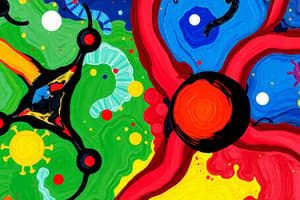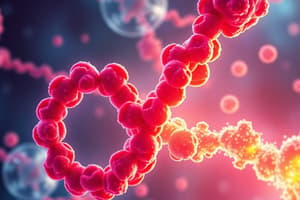Podcast
Questions and Answers
What is the primary interaction between antigens and antibodies called?
What is the primary interaction between antigens and antibodies called?
- Immune complex formation
- Paratope binding
- Epitope recognition
- Antigen-Antibody reaction (correct)
What is the role of an epitope in the antigen-antibody reaction?
What is the role of an epitope in the antigen-antibody reaction?
- It is the part of the antibody that binds to the antigen.
- It refers to the overall structure of the antigen.
- It is a type of antibody that can neutralize antigens.
- It is recognized by the immune system, specifically by B cells and T cells. (correct)
In which stage of the antigen-antibody reaction do visible events like precipitation and agglutination occur?
In which stage of the antigen-antibody reaction do visible events like precipitation and agglutination occur?
- Final stage
- First stage
- Third stage
- Second stage (correct)
What characteristic defines the specificity of antigen-antibody reactions?
What characteristic defines the specificity of antigen-antibody reactions?
What is the part of the antibody that recognizes the epitope called?
What is the part of the antibody that recognizes the epitope called?
What happens during the third stage of the antigen-antibody reaction?
What happens during the third stage of the antigen-antibody reaction?
What term describes simple molecules that can stimulate an immune response when conjugated to a protein?
What term describes simple molecules that can stimulate an immune response when conjugated to a protein?
Which of the following is NOT a component of humoral immunity?
Which of the following is NOT a component of humoral immunity?
What principle primarily determines the strength of the reaction between a single antigenic determinant and an antibody?
What principle primarily determines the strength of the reaction between a single antigenic determinant and an antibody?
Which of the following describes the overall capacity of antibodies to combine with a multivalent antigen?
Which of the following describes the overall capacity of antibodies to combine with a multivalent antigen?
What type of reaction occurs when a soluble antigen forms an insoluble precipitate with its corresponding antibody?
What type of reaction occurs when a soluble antigen forms an insoluble precipitate with its corresponding antibody?
What occurs during a cross-reaction in the context of antigen-antibody interaction?
What occurs during a cross-reaction in the context of antigen-antibody interaction?
Which bonds are primarily involved in the binding between antigen and antibody?
Which bonds are primarily involved in the binding between antigen and antibody?
In agglutination reactions, what is primarily used as antigens?
In agglutination reactions, what is primarily used as antigens?
What is the term for the region where an antigenic determinant binds on an antibody?
What is the term for the region where an antigenic determinant binds on an antibody?
What type of assay is ELISA?
What type of assay is ELISA?
Flashcards
What are antigens?
What are antigens?
Molecules that trigger an immune response.
What is an antigen-antibody (Ag-Ab) reaction?
What is an antigen-antibody (Ag-Ab) reaction?
The specific binding of an antigen to an antibody.
What are haptens?
What are haptens?
Small molecules that stimulate the immune system when combined with a larger molecule.
What is antibody specificity?
What is antibody specificity?
Signup and view all the flashcards
What is an epitope?
What is an epitope?
Signup and view all the flashcards
What is a paratope?
What is a paratope?
Signup and view all the flashcards
What is affinity?
What is affinity?
Signup and view all the flashcards
What is avidity?
What is avidity?
Signup and view all the flashcards
What is cross-reaction?
What is cross-reaction?
Signup and view all the flashcards
What is a precipitation reaction?
What is a precipitation reaction?
Signup and view all the flashcards
What is agglutination?
What is agglutination?
Signup and view all the flashcards
What is hemagglutination?
What is hemagglutination?
Signup and view all the flashcards
What is complement fixation?
What is complement fixation?
Signup and view all the flashcards
What is ELISA?
What is ELISA?
Signup and view all the flashcards
What is immunofluorescence?
What is immunofluorescence?
Signup and view all the flashcards
Study Notes
Antigen and Antibody Reactions
- Antigens are molecules that trigger an immune response and can be whole cells, viruses, and complex molecules
- Small molecules known as haptens can stimulate the immune system when conjugated with a larger molecule, such as a protein.
- Antigen-antibody (Ag-Ab) reaction refers to the specific binding of an antigen to an antibody.
- Ag-Ab reactions form the basis of humoral immunity.
Salient Features of Antigen-Antibody Reaction
- Specificity: An antibody's binding site reacts with only one specific antigenic determinant or antigen, making it highly specific.
- Binding site: The part of the antigen that binds to an antibody is called an epitope or antigenic determinant. The corresponding region on the antibody that recognizes the epitope is called a paratope.
- Binding force: The strength of the antigen-antibody bond is influenced by:
- Closeness: Proximity between antigen and antibody.
- Non-covalent bonds: Intermolecular forces, such as hydrogen bonds and electrostatic interactions.
- Antibody affinity: The intrinsic strength of the interaction between a single antigenic determinant and a single combining site on the antibody.
Properties of Antigen-Antibody Reaction
- Affinity: The strength of the interaction between a single antigenic determinant and a single combining site on the antibody.
- Avidity: The overall strength of the bond after an antigen-antibody complex is formed, reflecting how well an antibody can bind to a multivalent antigen with multiple epitopes.
- Cross-reaction: An antiserum raised against an antigen may react with a similar antigen of another type, but the strength of the antibody against its own antigen is stronger.
Types of Antigen-Antibody Reactions
- Precipitation reaction: When a soluble antigen combines with its antibody in the presence of electrolytes, it forms an insoluble precipitate of the Ag-Ab complex.
- Agglutination reaction: Involves the clumping of particulate antigens, such as bacteria or red blood cells, when they bind to specific antibodies. The reaction with red blood cells is called hemagglutination.
- Complement fixation: A test used to detect the presence of specific antibodies in serum. It involves the activation of the complement pathway by an antigen-antibody complex.
- ELISA (Enzyme-Linked Immunosorbent Assay): A sensitive technique that uses an enzyme-labeled antibody to detect and quantify antigens or antibodies in a sample.
- Immunofluorescence: A technique that uses fluorescently labeled antibodies to detect and localize antigens in cells or tissues.
Studying That Suits You
Use AI to generate personalized quizzes and flashcards to suit your learning preferences.



